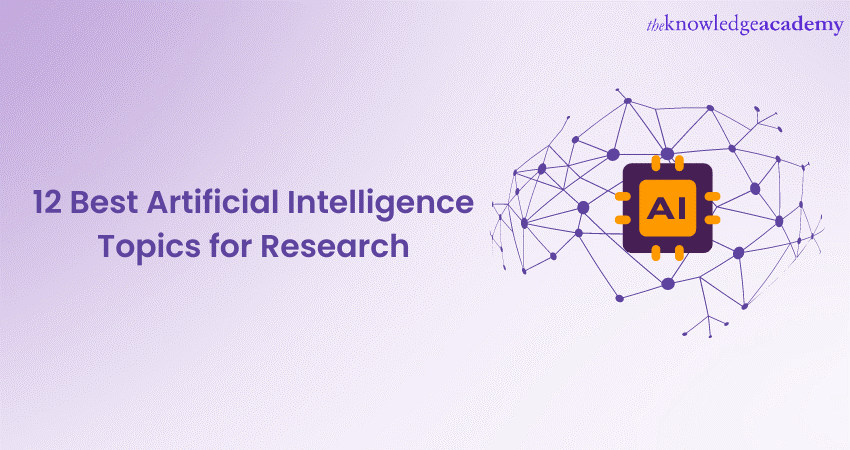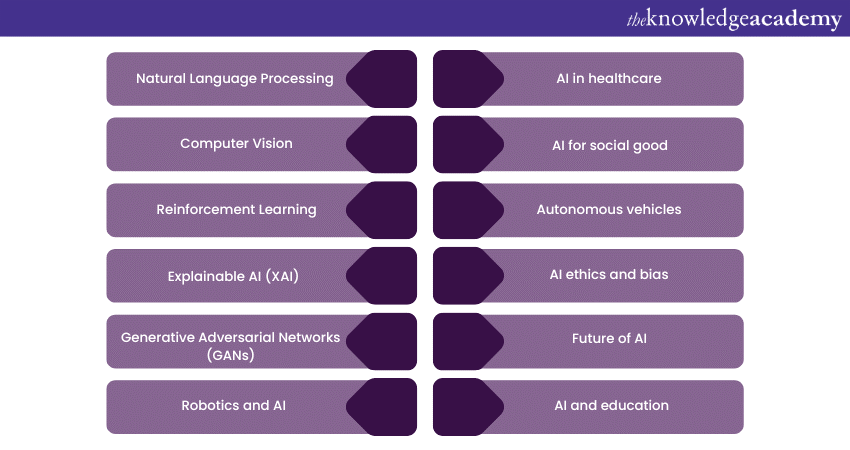We may not have the course you’re looking for. If you enquire or give us a call on 800600725 and speak to our training experts, we may still be able to help with your training requirements.
Training Outcomes Within Your Budget!
We ensure quality, budget-alignment, and timely delivery by our expert instructors.

Artificial Intelligence (AI) has undergone remarkable advancements over the years, permeating various facets of our lives. As Researchers continue to explore the boundaries of this field, they unearth a multitude of possibilities and challenges. In this blog, we embark on a journey to delve into 12 Artificial Intelligence Topics that stand as promising avenues for thorough research and exploration.
Table of Contents
1) Top Artificial Intelligence Topics for Research
a) Natural Language Processing
b) Computer vision
c) Reinforcement Learning
d) Explainable AI (XAI)
e) Generative Adversarial Networks (GANs)
f) Robotics and AI
g) AI in healthcare
h) AI for social good
i) Autonomous vehicles
j) AI ethics and bias
2) Conclusion
Top Artificial Intelligence Topics for Research
This section of the blog will expand on some of the best Artificial Intelligence Topics for research.

Natural Language Processing
Natural Language Processing (NLP) is centred around empowering machines to comprehend, interpret, and even generate human language. Within this domain, three distinctive research avenues beckon:
1) Sentiment analysis: This entails the study of methodologies to decipher and discern emotions encapsulated within textual content. Understanding sentiments is pivotal in applications ranging from brand perception analysis to social media insights.
2) Language generation: Generating coherent and contextually apt text is an ongoing pursuit. Investigating mechanisms that allow machines to produce human-like narratives and responses holds immense potential across sectors.
3) Question answering systems: Constructing systems that can grasp the nuances of natural language questions and provide accurate, coherent responses is a cornerstone of NLP research. This facet has implications for knowledge dissemination, customer support, and more.
Computer Vision
Computer Vision, a discipline that bestows machines with the ability to interpret visual data, is replete with intriguing avenues for research:
1) Object detection and tracking: The development of algorithms capable of identifying and tracking objects within images and videos finds relevance in surveillance, automotive safety, and beyond.
2) Image captioning: Bridging the gap between visual and textual comprehension, this research area focuses on generating descriptive captions for images, catering to visually impaired individuals and enhancing multimedia indexing.
3) Facial recognition: Advancements in facial recognition technology hold implications for security, personalisation, and accessibility, necessitating ongoing research into accuracy and ethical considerations.
Reinforcement Learning
Reinforcement Learning revolves around training agents to make sequential decisions in order to maximise rewards. Within this realm, three prominent Artificial Intelligence Topics emerge:
1) Autonomous agents: Crafting AI agents that exhibit decision-making prowess in dynamic environments paves the way for applications like autonomous robotics and adaptive systems.
2) Deep Q-Networks (DQN): Deep Q-Networks, a class of reinforcement learning algorithms, remain under active research for refining value-based decision-making in complex scenarios.
3) Policy gradient methods: These methods, aiming to optimise policies directly, play a crucial role in fine-tuning decision-making processes across domains like gaming, finance, and robotics.
Explainable AI (XAI)
The pursuit of Explainable AI seeks to demystify the decision-making processes of AI systems. This area comprises Artificial Intelligence Topics such as:
1) Model interpretability: Unravelling the inner workings of complex models to elucidate the factors influencing their outputs, thus fostering transparency and accountability.
2) Visualising neural networks: Transforming abstract neural network structures into visual representations aids in comprehending their functionality and behaviour.
3) Rule-based systems: Augmenting AI decision-making with interpretable, rule-based systems holds promise in domains requiring logical explanations for actions taken.
Generative Adversarial Networks (GANs)
The captivating world of Generative Adversarial Networks (GANs) unfolds through the interplay of generator and discriminator networks, birthing remarkable research avenues:
1) Image generation: Crafting realistic images from random noise showcases the creative potential of GANs, with applications spanning art, design, and data augmentation.
2) Style transfer: Enabling the transfer of artistic styles between images, merging creativity and technology to yield visually captivating results.
3) Anomaly detection: GANs find utility in identifying anomalies within datasets, bolstering fraud detection, quality control, and anomaly-sensitive industries.
Robotics and AI
The synergy between Robotics and AI is a fertile ground for exploration, with Artificial Intelligence Topics such as:
1) Human-robot collaboration: Research in this arena strives to establish harmonious collaboration between humans and robots, augmenting industry productivity and efficiency.
2) Robot learning: By enabling robots to learn and adapt from their experiences, Researchers foster robots' autonomy and the ability to handle diverse tasks.
3) Ethical considerations: Delving into the ethical implications surrounding AI-powered robots helps establish responsible guidelines for their deployment.
AI in Healthcare
AI presents a transformative potential within healthcare, spurring research into:
1) Medical diagnosis: AI aids in accurately diagnosing medical conditions, revolutionising early detection and patient care.
2) Drug discovery: Leveraging AI for drug discovery expedites the identification of potential candidates, accelerating the development of new treatments.
3) Personalised treatment: Tailoring medical interventions to individual patient profiles enhances treatment outcomes and patient well-being.
AI for Social Good
Harnessing the prowess of AI for Social Good entails addressing pressing global challenges:
1) Environmental monitoring: AI-powered solutions facilitate real-time monitoring of ecological changes, supporting conservation and sustainable practices.
2) Disaster response: Research in this area bolsters disaster response efforts by employing AI to analyse data and optimise resource allocation.
3) Poverty alleviation: Researchers contribute to humanitarian efforts and socioeconomic equality by devising AI solutions to tackle poverty.
Unlock the potential of Artificial Intelligence for effective Project Management with our Artificial Intelligence (AI) for Project Managers Course. Sign up now!
Autonomous Vehicles
Autonomous Vehicles represent a realm brimming with potential and complexities, necessitating research in Artificial Intelligence Topics such as:
1) Sensor fusion: Integrating data from diverse sensors enhances perception accuracy, which is essential for safe autonomous navigation.
2) Path planning: Developing advanced algorithms for path planning ensures optimal routes while adhering to safety protocols.
3) Safety and ethics: Ethical considerations, such as programming vehicles to make difficult decisions in potential accident scenarios, require meticulous research and deliberation.
AI Ethics and Bias
Ethical underpinnings in AI drive research efforts in these directions:
1) Fairness in AI: Ensuring AI systems remain impartial and unbiased across diverse demographic groups.
2) Bias detection and mitigation: Identifying and rectifying biases present within AI models guarantees equitable outcomes.
3) Ethical decision-making: Developing frameworks that imbue AI with ethical decision-making capabilities aligns technology with societal values.
Future of AI
The vanguard of AI beckons Researchers to explore these horizons:
1) Artificial General Intelligence (AGI): Speculating on the potential emergence of AI systems capable of emulating human-like intelligence opens dialogues on the implications and challenges.
2) AI and creativity: Probing the interface between AI and creative domains, such as art and music, unveils the coalescence of human ingenuity and technological prowess.
3) Ethical and regulatory challenges: Researching the ethical dilemmas and regulatory frameworks underpinning AI's evolution fortifies responsible innovation.
AI and Education
The intersection of AI and Education opens doors to innovative learning paradigms:
1) Personalised learning: Developing AI systems that adapt educational content to individual learning styles and paces.
2) Intelligent tutoring systems: Creating AI-driven tutoring systems that provide targeted support to students.
3) Educational data mining: Applying AI to analyse educational data for insights into learning patterns and trends.
Unleash the full potential of AI with our comprehensive Introduction to Artificial Intelligence Training. Join now!
Conclusion
The domain of AI is ever-expanding, rich with intriguing topics about Artificial Intelligence that beckon Researchers to explore, question, and innovate. Through the pursuit of these twelve diverse Artificial Intelligence Topics, we pave the way for not only technological advancement but also a deeper understanding of the societal impact of AI. By delving into these realms, Researchers stand poised to shape the trajectory of AI, ensuring it remains a force for progress, empowerment, and positive transformation in our world.
Unlock your full potential with our extensive Personal Development Training Courses. Join today!
Frequently Asked Questions
Upcoming Data, Analytics & AI Resources Batches & Dates
Date
 Introduction to AI Course
Introduction to AI Course
Fri 24th Jan 2025
Fri 28th Mar 2025
Fri 23rd May 2025
Fri 25th Jul 2025
Fri 26th Sep 2025
Fri 28th Nov 2025







 Top Rated Course
Top Rated Course



 If you wish to make any changes to your course, please
If you wish to make any changes to your course, please


